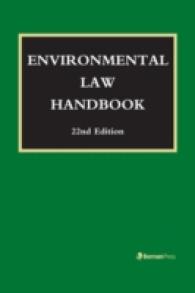- ホーム
- > 洋書
- > 英文書
- > History / World
基本説明
New in paperback. Hardcover was published in 2008. Seeks to understand how the 1949-1953 period was experienced by various groups, including industrialists, filmmakers, ethnic minorities, educators, rural midwifes, philanthropists, stand-up comics, and scientists.
Full Description
This illuminating work examines the social, cultural, political, and economic dimensions of the Communist takeover of China. Instead of dwelling on elite politics and policy-making processes, Dilemmas of Victory seeks to understand how the 1949-1953 period was experienced by various groups, including industrialists, filmmakers, ethnic minorities, educators, rural midwives, philanthropists, stand-up comics, and scientists.
A stellar group of authors that includes Frederic Wakeman, Elizabeth Perry, Sherman Cochran, Perry Link, Joseph Esherick, and Chen Jian shows that the Communists sometimes achieved a remarkably smooth takeover, yet at other times appeared shockingly incompetent. Shanghai and Beijing experienced it in ways that differed dramatically from Xinjiang, Tibet, and Dalian. Out of necessity, the new regime often showed restraint and flexibility, courting the influential and educated. Furthermore, many policies of the old Nationalist regime were quietly embraced by the new Communist rulers.
Based on previously unseen archival documents as well as oral histories, these lively, readable essays provide the fullest picture to date of the early years of the People's Republic, which were far more pluralistic, diverse, and hopeful than the Maoist decades that followed.
Contents
Acknowledgments 1. The Early Years of the People's Republic of China: An Introduction Jeremy Brown and Paul G. Pickowicz Part I: Urban Takeover 2. "Clean-Up": The New Order in Shanghai Frederic Wakeman, Jr. 3. Masters of the Country? Shanghai Workers in the Early People's Republic Elizabeth Perry 4. New Democracy and the Demise of Private Charity in Shanghai Nara Dillon Part II: Occupying the Periphery 5. From Resisting Communists to Resisting America: Civil War and Korean War in Southwest China, 1950-51 Jeremy Brown 6. The Chinese Communist "Liberation" of Tibet, 1949-1951 Chen Jian 7. Big Brother is Watching: Local Sino-Soviet Relations and the Building of New Dalian, 1945-1955 Christian Hess 8. The Call of the Oases: The "Peaceful Liberation" of Xinjiang, 1949-1953 James Z. Gao Part III: The Culture of Accommodation 9. The Crocodile Bird: Xiangsheng in the Early 1950s Perry Link 10. "The Very First Lesson": Teaching about Human Evolution in Early 1950s China Sigrid Schmalzer 11. Acting Like Revolutionaries: Shi Hui, the Wenhua Studio, and Private-Sector Filmmaking, 1949-1952 Paul G. Pickowicz 12. Creating "New China's First New-Style Regular University," 1949-50 Douglas A. Stiffler Part IV: Family Strategies 13. The Ye Family in New China Joseph W. Esherick 14. Birthing Stories: Rural Midwives in 1950s China Gail Hershatter 15. Capitalists Choosing Communist China: The Liu Family of Shanghai, 1948-1956 Sherman Cochran Notes Index








